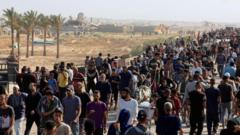In the Nuseirat refugee camp, the struggle for basic resources like water has turned deadly. Mahmoud Abdul Rahman Ahmed recounted the heart-wrenching moment his son, Abdullah, was struck down while merely searching for a sip of water. This tragic incident that claimed ten lives, including six young children, has drawn international outrage and calls for action to address the deteriorating humanitarian situation in Gaza.
Gaza Tragedy: Father Grieves Son Killed While Seeking Water Amid Conflict

Gaza Tragedy: Father Grieves Son Killed While Seeking Water Amid Conflict
A father's anguish surfaces as his son is killed during an Israeli airstrike aimed at a water distribution point in Gaza, highlighting the ongoing humanitarian crisis.
On a recent Sunday morning, Abdullah and other children stood in line at a water distribution site, empty jerrycans in hand, when Israeli bombers targeted the area with no warning. Mahmoud, grieving, described the dire conditions faced by the children, forced to wait for basic necessities amidst ongoing conflict. “They were just kids,” he lamented, voicing his despair over the relentless violence that shatters the dreams of innocence.
An immediate response from the Israeli military acknowledged a "technical error" during the operation, claiming they had intended to hit a specific target related to a Palestinian Islamic Jihad operative. However, Mahmoud rejected these justifications, asserting the broader implications of ongoing strikes on civilian life. “This war needs to stop… we are victims,” he asserted, reflecting the sentiment of many in the region grappling with the destruction of their homes and loss of family.
The United Nations has raised alarms over a growing water crisis in Gaza, where many families receive less than the emergency standard of 15 liters daily, exacerbated by fuel shortages and military actions that impede access to essential services. Reports indicate that the situation has spiraled into a "human-made drought crisis," with humanitarian organizations warning that children bear the brunt of these conditions.
UN officials highlighted that incidents like the one that killed Abdullah are all too frequent, with estimates suggesting that in the current conflict, approximately a classroom's worth of children have died daily. The international community is called to reflect on the responsibility to protect civilians, especially children, as discussions surrounding humanitarian law and wartime conduct escalate.
As the UN Security Council prepares to convene to address the rampant violence in Gaza, Mahmoud remains a voice for the voiceless, passionately pleading for an end to the conflict and a collective effort toward peace. Amidst grief, his call resonates: “We are civilians… we don’t own any weapons. We just want to live.”
The tragedy of innocent lives lost amid warfare underscores the critical need for global attention on humanitarian crises and the pursuit of diplomatic resolutions.
An immediate response from the Israeli military acknowledged a "technical error" during the operation, claiming they had intended to hit a specific target related to a Palestinian Islamic Jihad operative. However, Mahmoud rejected these justifications, asserting the broader implications of ongoing strikes on civilian life. “This war needs to stop… we are victims,” he asserted, reflecting the sentiment of many in the region grappling with the destruction of their homes and loss of family.
The United Nations has raised alarms over a growing water crisis in Gaza, where many families receive less than the emergency standard of 15 liters daily, exacerbated by fuel shortages and military actions that impede access to essential services. Reports indicate that the situation has spiraled into a "human-made drought crisis," with humanitarian organizations warning that children bear the brunt of these conditions.
UN officials highlighted that incidents like the one that killed Abdullah are all too frequent, with estimates suggesting that in the current conflict, approximately a classroom's worth of children have died daily. The international community is called to reflect on the responsibility to protect civilians, especially children, as discussions surrounding humanitarian law and wartime conduct escalate.
As the UN Security Council prepares to convene to address the rampant violence in Gaza, Mahmoud remains a voice for the voiceless, passionately pleading for an end to the conflict and a collective effort toward peace. Amidst grief, his call resonates: “We are civilians… we don’t own any weapons. We just want to live.”
The tragedy of innocent lives lost amid warfare underscores the critical need for global attention on humanitarian crises and the pursuit of diplomatic resolutions.




















